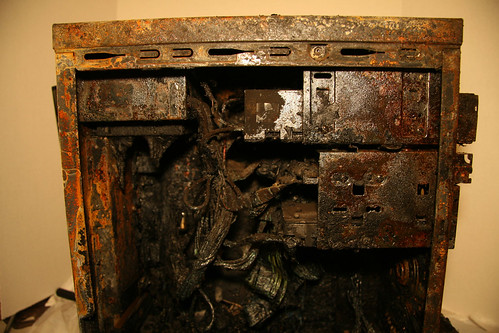Note: I’ve decided to do a series of posts that will help you make 2011 the best genealogy year possible. I have a few topics up my sleeve, but if there are any in particular that you’d like to see covered, then please, send me an email.
As genealogists, we are constantly collecting lots of information: print outs from websites, copies from books, downloads of records, emails, etc. We would be devastated if we ever lost this information – and yet there are so many ways for our genealogy research to get destroyed or lost.
Hard drive crashes. Massive floods. Fires. Mudslides. Tornadoes. Burglary. Alien Invasion.
(Ok… maybe that last one was a bit far-fetched. But you get the idea).

Photo created by: pyroclastichawk on Flickr.com (http://goo.gl/gqxH1)
Preventing the Loss of Your Data:
- Create a plan. Just as you have an emergency evacuation plan for your home and family, you should have an emergency plan for keeping your genealogy data safe. You should outline a plan that includes step-by-step instructions for keeping your genealogy safe. Don’t forget to plan for the worse case scenario – while you hope you never have to put it into place, knowing what to do will give you a sense of calm should the worst ever happen.
- Have Multiple Solutions. One solution to backing up your data is never enough. You should aim to have different types of back up methods for your research: external hard drives, remote back up services, DVDs, etc. Your goal is to have your research in a variety of places such as in “the cloud”, your desk, your purse, your safe deposit box, and even Aunt Martha’s home on the other side of the country. Why? Well, let’s say you kept all of your research inside your home. Then let’s say a fire swept through your home. Having your genealogy on your laptop, external hard drive, and some DVDs (which were all kept in your home), won’t do you much good since your home and everything inside of it has been destroyed. This is why you need your research accessible in multiple places.
- Remote Back Up Services: A remote back up service is a program that takes a copy of your data and puts it in “the cloud”. In other words, it puts a copy of your data on a remote server far far away from your home. The great thing about this method is that it is often a “set it and forget it” sort of method. The two top companies in this are Mozy and Carbonite. Personally, I use and love Mozy – it is easy to use and backs up my data automatically. Through December 31st, Mozy is offering a 10% discount and up to 3 months free if you use the coupon code DECEMBER.
- External Hard Drives: These methods are also great to protect your data from a computer crash. External hard drives are also pretty cheap, readily available, and easy to use. You can also easily take them with you.
- Flash Drives: Flash drives are very similar in use to external hard drives, except they don’t hold as much data. These hand little devices are cheap and offer a variety of space options. Another great advantage of a flash drive: You can easily slip it into your pocket or purse.
- DVDs: While DVDs will not last nearly as long as some of the other technologies mentioned, these are great to send to family and friends every 6 months to a year. Make sure you send the DVD to someone who lives far away from you, so that they can send the DVD back to you should all of your other back up methods fail. These are also nice to use when sharing your family history with family members or friends.
What Are Your Thoughts?
Do you have a back up plan in place? What do you use to keep your data safe? Are you going to change any of your methods in 2011?
Popularity: 8% [?]

